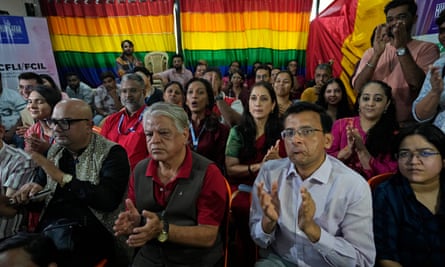India’s top court has declined to grant legal recognition to same-sex marriages, saying it is beyond its scope and should be decided by parliament, but emphasising that queer relationships should not face discrimination by the state.
The marriage ruling will be a disappointment for LGBTQ+ people in India, who had hoped the supreme court judges would recognise their constitutional right to marriage equality.
In a sign of how contentious the issue remains in India, the five-judge bench of the supreme court, led by the chief justice of India, said they had been divided on the matter, and four separate judgments were written by the bench. Two of the judges had supported same-sex civil unions but the majority verdict ruled against them.
Rohin Bhatt, one of the lawyers in the case, said: “Today the court has reaffirmed that queer citizens will be relegated to an unsympathetic legislature and an apathetic executive. We are second-class citizens, no matter how many judicial platitudes say otherwise. We will rise in rage and protest.”
Rediscovering India’s lost queer icons: a tour of Old Delhi’s secret historyRead more
In 2018 the supreme court scrapped a colonial-era law banning homosexuality in India. But while acceptance of homosexuality is growing, Indian society still remains largely conservative and there was resistance to opening up marriage to same-sex couples, who still face rampant discrimination and harassment in society.
Ankita Khanna, who was one of the petitioners in the case, said she was “deeply disappointed”.
“The hearings and the months thereafter had given us a lot of hope: that we were in the highest court of the country, and that our struggles were being heard and deliberated upon deeply,” she said.
“But what we got today was a deeply divided judgment that was unclear about what the law could offer as relief to the challenges of our unequal and diverse queer lives.”
Khanna added: “Having said that, the queer community will continue to move forward in solidarity and with resilience, as we always have.”
The ruling Hindu nationalist Bharatiya Janata party (BJP) government had opposed the case, calling the arguments for equality “urban elitist views” and stating that marriages were not “comparable with the Indian family unit concept of a husband, a wife and children”. It had argued that the matter should be decided in parliament, not the courts.
The petitioners, which included dozens of LGBTQ+ couples and activists who came together in a collective lawsuit, had been fighting to amend India’s special marriage act – which allows civil unions between couples of different religions – to be expanded to include same-sex couples. In India, LGBTQ+ couples are denied rights such as joint bank accounts, being the legal next of kin, and recognition for inheritance, while marriage remains a fundamental pillar of society.
 People watch the hearings and wait for the supreme court verdict in Mumbai. Photograph: Rafiq…
People watch the hearings and wait for the supreme court verdict in Mumbai. Photograph: Rafiq…
2023-10-17 06:18:17
Original from www.theguardian.com













